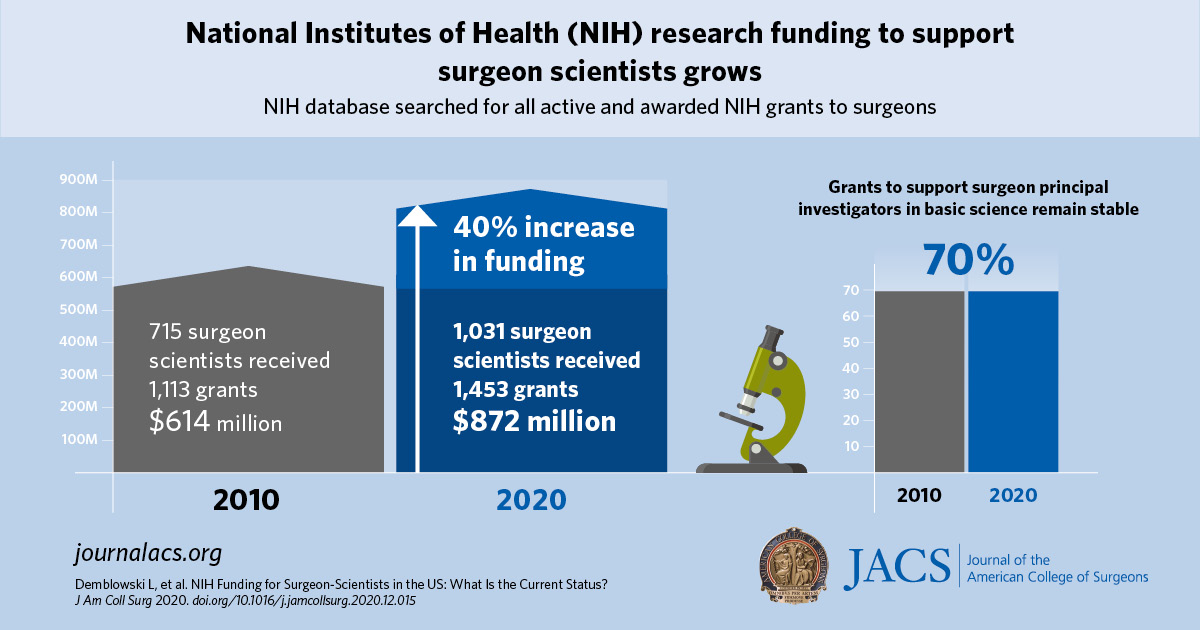Key findings
- In June 2010, 715 surgeon scientists were supported by 1,113 grants, totaling $614 million in NIH funding. In June of 2020, 1,031 surgeon scientists were supported by 1,453 grants, totaling $872 million in NIH funding.
- General surgery-based subspecialties topped the list, comprising one-quarter of the funded specialties and close to 40 percent of the total funding.
- Obstetrics/gynecology was the second most funded surgical specialty.
- Neurological surgery was third.
Surgical oncology funding remains strong
General surgeons with a sub-subspecialty in surgical oncology led the group of general surgery-trained surgeons in number of NIH-funded surgeons and total grant awards in both 2010 and 2020.
- In 2020, 27 percent of those trained in general surgery were surgical oncologists, holding about 44 percent of the total grant cost for all general surgeons.
- In 2010, surgical oncology also represented the majority of general surgery subspecialties, holding more than one-third of the funding for surgeons trained in general surgery.
Focus on basic science stable
“We also found that basic science has remained stable since 2010,” Dr. Zeiger said. In fact, 70 percent of principal investigator-initiated grants are in basic science, and surgeons have maintained that percentage over the past 10 years.”
From 2010 to 2020, the researchers also found an increase in cooperative research grants, underscoring the fact that surgeon scientists working in multidisciplinary team research is on the rise.
“Surgeons contribute a tremendous amount to science, and, historically, they always have. They are very challenged these days because obtaining NIH funding has become more competitive,” Dr. Zeiger said. “We also have increasing administrative responsibilities because of the electronic medical record, and clinical productivity is emphasized more and more across the country, especially for surgical subspecialties.”
“Overall, I think it’s remarkable that surgeon scientists have not only maintained, but significantly increased the amount of NIH funding they are supported by over the past 10 years. Most important, they have also maintained a strong emphasis on basic science research,” she concluded.
“Surgeon scientists have made outstanding gains in securing more NIH research funding. These exciting results show the dedication that they have to life-long learning and innovative research, along with a passion for science. Moreover, these findings show how committed surgeons are to seeking scientific pathways to continually improve the quality of surgical care for our patients, which is our highest priority,” said ACS Executive Director David B. Hoyt, MD, FACS, a study coauthor.
Study coauthors are Lindsay A. Demblowski, Brad Busse, PhD, George Santangelo, PhD, Andrew M. Blakely, MD, and Patricia L. Turner, MD, FACS.
The opinions expressed by the authors are their own and this material should not be interpreted as representing the official viewpoint of the U.S. Department of Health and Human Services, the National Institutes of Health or the National Cancer Institute.
“FACS” designates that a surgeon is a Fellow of the American College of Surgeons.
Citation: NIH Funding for Surgeon-Scientists in the US: What Is the Current Status?, Journal of the American College of Surgeons. DOI: 10.1016/j.jamcollsurg.2020.12.015

